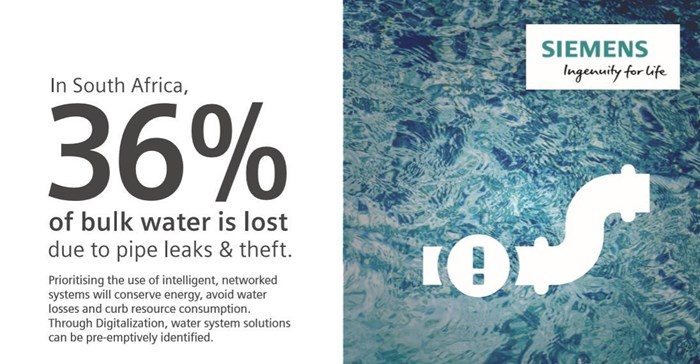Rapid urbanisation across the continent is having an effect on water demands and it is estimated that by the year 2030, the world will need 40% more water than its current accessible, reliable supply.
Compounding the issue and according to the UN’s Water for Life Report, it is estimated that approximately 300 of the 800 million inhabitants in Sub-Saharan Africa live in a water-scarce environment. While in South Africa’s Western Cape region there is a drought that one meteorologist referred to as a once-in-628-years weather event.
Water is vital to human existence. We depend on the resource to carry out important economic activities and provide proper sanitation, which are crucial elements to well-being and health. If neglected, there will be far reaching implications for government, business and ultimately society.
Water education
Awareness about the importance and finite availability of the resource are crucial to widespread behaviour change and necessary to ensure environmental sustainability, and capacity for future generations. Water education should not be restricted to scientific or factual knowledge but be holistic and include decision makers, water technicians, communities, stakeholders and media to promote systemic change.
When a resource is in such short supply, managing and producing it effectively is essential. Digitalisation of the existing infrastructure is just one water wise move for both the public and private sector.
The water industry has been focused on ushering in a new era of water management, with an emphasis on automation, the internet of things (IoT) and more sophisticated data management and analysis software that enables the water end user or plant operator to have valuable, actionable information.
This proactive focus is driving digital transformation for both utilities and industrial plants, and enables them to not only detect and react to an issue when it occurs, but also predict and prevent issues from occurring.
Leaks and theft
In South Africa, local municipalities are losing up to 36% of bulk water due to pipe leaks and theft. Smart water management technologies and digital management systems combined with faster response times could dramatically increase water reliability and significantly reduce losses.
Prioritising the use of intelligent, networked systems will conserve energy, avoid water losses and curb resource consumption. By having a 360 degree view of a water system, solutions can be pre-emptively identified.
As we progress further into the Fourth Industrial Revolution, agility and inventiveness will become a pivotal requirement for the new world order. Climate change and global water shortages are a collective concern. In the latest World Economic Forum Global Risks Report, water crises ranks 20th as one of the risks respondents are most concerned about for doing business in their country in the next 10 years.
Major innovation needed
To overcome this risk we will need to deploy major innovations. Imagine using 3D virtual technology to see a realistic representation of an existing water plant and overlaying how automation, drives, pumps, instrumentation and electrical components can best be implemented to ensure positive outcomes. Through the recent acquisition of Bentley Systems, Siemens is able to create a water plant simulation allowing for predictive maintenance, resource optimisation and energy data management.
Another way in which Siemens is catalysing creativity in the digital economy is through a recently hosted 48-hour hackathon - #DigihackAfrica2018 - which brought together Siemens engineers alongside IoT and digital industry experts from IBM, IoT.Nxt, Atos and Wits University to work on ideas that will have the potential to disrupt the Industrial IoT environment (IIoT) in Africa.
The winning team presented a decentralised intelligent water management system. The fully automated water accounting and leak detection system is made up of intelligently linked instrumentation from Siemens, flow meters and pressure transmitters linked to a GPRS 3G module that sends signals back to an in-house cloud based system. Through a mobile app, water technicians and engineers on the field will have real-time monitoring access to the flow of water in any water infrastructure network on a device. The winning team will travel to Siemens HQ to further develop their idea and receive seed capital towards making their idea commercially viable.
High economic dividends
The value of investment in R&D in Africa to find solutions to the water crisis should not be underestimated. Being able to have foresight about future problems and develop solutions, with a uniquely African view and relevance, will provide the continent with a competitive edge.
Ultimately, effective and smart water management will enable governments and utilities to provide a safe and reliable resource to its people. Improved water stewardship pays high economic dividends and technology can help to make this happen. It seems like a smart start and a step in the right direction to find sustainable solutions that work for Africa and in Africa.









































